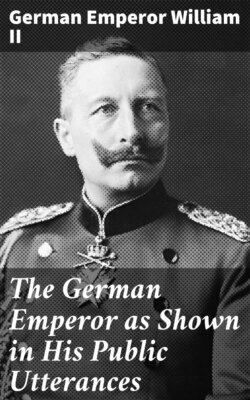Читать книгу The German Emperor as Shown in His Public Utterances - German Emperor William II - Страница 9
На сайте Литреса книга снята с продажи.
TO MY PEOPLE
ОглавлениеTable of Contents
Potsdam, June 18, 1888
Three days after his pronouncements to the army and navy Emperor William II issued the following proclamation to his people. In temperament the son was quite unlike his father. The wife of Frederick I and the mother of the present Emperor was an English princess, Victoria (daughter of Queen Victoria), and through her Frederick is generally said to have been influenced by the more liberal English tradition. Critics of William II have occasionally annoyed him by repeating, justly or unjustly, that his father regarded certain elements in his character with disapproval. However that may be, it is true that the people regarded Frederick in a different light from that in which they have come to regard his son. In reading the speeches of William II one is conscious of the fact that he is speaking from a certain eminence, that the Emperor never forgets that he enjoys the advantage of position. He has, therefore, put between himself and his people a certain distance which did not exist in the case of his father. The father treated his subjects as if he were one of them, and it is this fact that led them fondly to call him “Unser Fritz.” However great the respect which they feel for the son, none of his subjects would think of bestowing any such title on William II, and, even if they did, it is doubtful whether he would feel in any way complimented thereby. He is in this respect more like his ancestor Frederick the Great than like his father or grandfather, and it is a striking fact that in all his speeches he never once mentions this somewhat familiar title, of which his father was proud.
God has again hung about us the pall of deepest mourning. Hardly had the grave closed upon my ever-memorable grandfather, than his Majesty, my dearly beloved father, was called from this earthly sojourn to everlasting peace. The heroic energy, born of Christian humility, with which, unmindful of his sufferings, he accomplished his royal duties seemed to leave room for the hope that he would be spared still longer to the Fatherland. God has willed it otherwise. To the royal sufferer whose heart was moved by all that was great and beautiful, only a few months were allotted in which he might display upon the throne the noble qualities of heart and soul which have won for him the love of his people. The virtues which adorned him and the victories which he gained on fields of battle will be gratefully remembered as long as German hearts beat, and undying fame will illumine his knightly figure in the history of the Fatherland.
Called to the throne of my fathers, I have taken over the government, looking to the King of all kings, and have vowed to God, following the example of my father, to be a righteous and gentle prince, to foster piety and the fear of God, to maintain peace, to further the welfare of the country, to be a help to the poor and oppressed, and to be to the righteous man a true protector.
If I pray God for strength to fulfil these royal duties which He has laid upon me, I am buoyed up by that faith in the Prussian people which a consideration of our past history confirms in me. In good and in evil days Prussia’s people have ever stood faithfully to their kings. I, too, count upon this fidelity, which has ever been preserved inviolable toward my fathers in all times of trial and danger; for I am conscious that I reciprocate it whole-heartedly, as a faithful prince of a faithful people, and that we are both equally strong in our devotion to a common Fatherland. From this consciousness of the mutual love which binds me to my people, I derive the confidence that God will give me wisdom and strength to exercise my kingly office for the welfare of the Fatherland.
William.
Potsdam, June 18, 1888.
